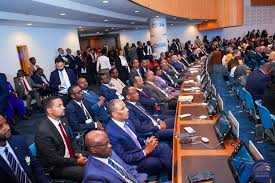
By Jeff Kapembwa
Climate Change campaigner convening in Brazil’s Belem City for COP 30 should take climate action to close the adaptation gap, align climate funding with food systems and accelerate a just transition as earth devastation heightens, fueled by fossil fuels.
Ahead of the climate change global indaba planned for 10-21 November, United Nations Secretary General Anthony Gutierrez challenges campaigners at the forthcoming annual global event to be proactive, take action in reversing the devastations because the ‘future of food is the future of humanity’.
“Let us work together to build food systems that nourish every person, restore our planet and grow prosperity from the ground up.” Gutierrez told delegates to the just ended +4 Stocktake (UNFSS+$) conference hosted by Ethiopia and co-hosted by Ethiopia and Italy at the Economic Commission for Africa (ECA) head office.
The call for action calls for peace to allow investments to take root and farmers to look to the future with confidence.
Guterres’ in a video message noted that four years, the world joined hands for the first UN food system summit, anchored in the understanding that food systems are about more than food
Four years ago, the world came together for the first UN Food Systems Summit, anchored in the understanding that food systems are about more than food.” he says
“They are about health, nutrition, climate, decent work, justice and the right to a better future.”
The aftermath has culminated into progress with two thirds of countries having integrated food-systems transformation into national development plans.
Over 100 have aligned food strategies with climate and biodiversity goals. And 155 countries are advancing efforts with National Convenors and strong engagement from businesses, civil society, Indigenous Peoples, youth and farmers.
The UN system, including through the UN Food Systems Coordination Hub, is their partner every step of the way.
Last year’s Pact for the Future reaffirmed our shared commitment to food systems that are inclusive, sustainable, equitable, resilient and rooted in human rights but more needs to be done but not without investment.
“But progress is not fast or fair enough. Global hunger is rising. Trade shocks are pushing food prices out of reach. One third of the world’s people cannot afford a healthy diet, while one third of the world’s food is lost or wasted.” he said.
” The hidden costs of our food systems — on health, nature and human suffering — exceed $10 trillion a year.” He says, likening it to the crisis of justice.
“That’s more than three times the GDP [gross domestic product] of the African continent. This is not just a crisis of scarcity. It is a crisis of justice, equity and climate.”
Nearly 40 per cent of the global workforce is linked to food systems; yet, many remain trapped in poverty. Climate change is disrupting harvests, supply chains and humanitarian response.
He laments conflicts heightening — from Gaza to Sudan and beyond. Hunger, he notes, feeds further instability — and undermines peace and that: “We must never accept hunger as a weapon of war.”
We know what works. Every dollar invested in nutrition can return up to 23. Sustainable food systems can advance all 17 Sustainable Development Goals. And transformation is under way.
Governments are leading the way — integrating food systems into climate strategies, biodiversity frameworks and national budgets.
They are empowering women and youth, scaling up nutritious school meals and investing in agroecology.
The UN remains optimistic that the matter will be resolved with joint efforts.
He calls for the break in silos, noting that food systems are everyone’s business, driven by integrated policies.
“We need integrated policies and a global framework that connects agriculture to people — their health, climate, trade and finance. We must also harness new technologies — including artificial intelligence — to boost production, reduce waste and create decent jobs across the value chain.
There is a need to address power imbalances. We must govern food systems fairly, tackle inequality and deliver on the right to food for all. That means elevating the voices of women, youth, farmers, Indigenous Peoples and local actors.
There is an unwavering need to unlock and connect finance at scale and that transformation requires investment.
The world needs considerable debt relief, greater access to concessional finance and reform of the global financial system to give developing countries representation that reflects the realities of today’s global economy driven by peace to lure investment.
We need peace so that investments can take root and farmers can look to the future with confidence.
“The future of food is the future of humanity. Let us work together to build food systems that nourish every person, restore our planet and grow prosperity from the ground up.”
